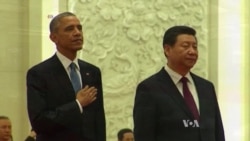From cyber security to the South China Sea, President Barack Obama will welcome his Chinese counterpart to the White House amid U.S. concerns about China’s behavior in a range of areas.
“Xi Jinping is coming here amidst the most difficult atmosphere in U.S.-China relations that any Chinese leader has faced in a major visit to the United States,” said Robert Daly, director of the Wilson Center’s Kissinger Institute on China and the U.S.
Daly said there are questions on the American side about China’s long-term intentions, the nature of Xi’s government, “about whether or not it is aiming to challenge the United States regionally and nationally, and whether it is planning to challenge the world order.”
These concerns have prompted some critics of the administration to question whether Friday’s state visit should even be happening.
But deputy national security adviser Ben Rhodes said the U.S. policy of sustained engagement with Chinese leadership is critical.
"This is the most consequential bilateral relationship in the world, given the breadth of issues on which the United States and China have common interests, or at times have differences,” Rhodes said in a press call on Tuesday.
China in cyber space
The talks come in the aftermath of a cyber attack that compromised the information of more than 21 million Americans — a breach blamed on China.
In an interview published Tuesday in The Wall Street Journal, Xi said China also has been a victim of hacking and denied any governmental role in stealing business data.
"The Chinese government does not engage in theft of commercial secrets in any form, nor does it encourage or support Chinese companies to engage in such practices in any way," Xi wrote.
Obama last week told U.S. business leaders that China’s behavior in cyber space would be one of the main topics during his talks Friday with Xi.
Obama said he understands intelligence-gathering functions that all states engage in, including attempts by China to obtain state secrets or meeting transcripts.
“We understand you're going to be trying to do that. That is fundamentally different from your government or its proxies engaging directly in industrial espionage and stealing trade secrets, stealing proprietary information from companies,” Obama said. “That, we consider an act of aggression that has to stop.”
Obama has raised such concerns as far back June 2013, when the two leaders met in California.
David Lampton, director of China Studies at Johns Hopkins University’s School of Advanced International Studies, said the credibility of the Obama administration is affected by how long it allows itself to be pushed back.
“I think we need to make some progress on these issues or we are going to have to think about how to articulate our interests in a more effective way,” Lampton said.
Among the options: countervailing actions, such as economic sanctions. Rhodes said that while the administration’s preference is dialogue and diplomacy, “we would be prepared, if necessary, to pursue sanctions as a tool if we felt that there was a case that merited that type of punitive action.”
South China Sea
Another area where some would like to see more assertive U.S. action is in the South China Sea, where Beijing has been creating artificial islands in waters where other countries have overlapping claims.
The Wilson’s Center Daly said the United States should conduct freedom-of-navigation cruises within 12 nautical miles of China’s man-made islands to send a clear message to Beijing.
“There can be a new normal in which we put down markers and assert our navigational rights or a new normal in which we don’t. And that is acceding to Chinese wishes,” Daly said.
White House officials emphasized that the United States has a global freedom-of-navigation program it conducts around the world, including in the South China Sea.
Dan Kritenbrink, the National Security Council’s senior director for Asian affairs, said the U.S. military intends to operate “anywhere and at any time” it is allowed to do so under international law.
“Our goal is to support and sustain the liberal rules-based order, and that applies on maritime issues,” Kritenbrink said in a press call. “We are looking to uphold these larger principles of international law, such as freedom of navigation, freedom of overflight, unimpeded lawful commerce and peaceful resolution of disputes.”
Engagement
Despite significant differences on certain issues, White House officials emphasize areas where the United States and China have collaborated, including on climate change in advance of the U.N. conference in December.
“As the two biggest emitters, our ability to work together is what unlocks the possibility of reaching that type of agreement,” Rhodes said. “On Iran, China was instrumental in reaching the P5+1 agreement. On North Korea, I think we have seen in recent years an increasing Chinese willingness to understand that we need to be underscoring the necessity of denuclearization and, as necessary, applying pressure on the North Korean regime.”
The Wilson Center’s Daly agreed that differences should not be a reason for disengagement.
“I think engagement remains extremely important and has to be the cornerstone of the relationship," he said. "We do not have the option of ignoring or isolating China.”
But while Obama looks to frankly convey U.S. concerns, analysts say Xi will most likely be concerned with how the visit plays out on television sets back home.





